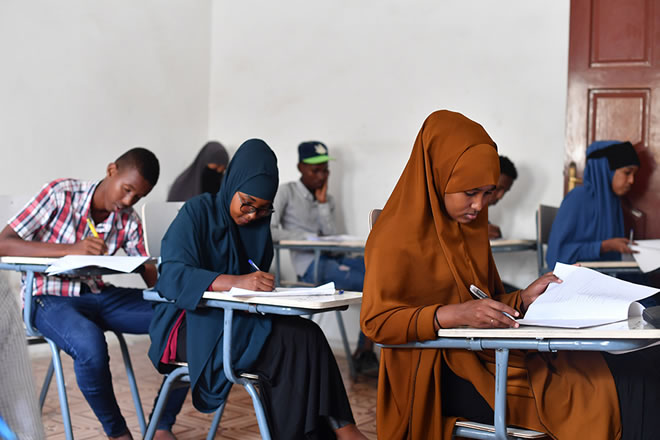by Saida Hassan
Wednesday, September 16, 2020

I am utterly dismayed about the recurring dilemma that the Somali students find themselves in year after year. Every year as Somalia tries to move forward as a nation, its education system spirals into chaos. This is the sixth year that national exams have been conducted and each year we inch towards a complete system failure. Witnessing yet again another controversy surrounding the national exams, I can’t help but reflect upon my stint working at the Federal Ministry of Education, Culture and Higher Education (MOECHE). To be fair, some of the folks at the ministry are inherently good and genuinely working towards systemic change but, my experience at the ministry was profoundly disheartening. There are external and internal challenges hindering the realization of a quality education system in Somalia. While the Ministry is the authority entrusted with our national education and ultimately the final accountability lies with it. However, I can attest to the unsurmountable pressures the Ministry faces in achieving quality education for all.
My job was to provide the technical support needed to recognize necessary policies that frame quality education system. Needless to say none of policy objectives were achieved. Some of the obstacles I faced included the lack of leadership to follow through with the work at hand. It was difficult to start a particular objective and see it through the finish line. There was also lack of coordination and communication to guide the work.
As we observe closely the progress of Somalia, it is evident that there is no consistency and capacity to counter crisis. Inexperience and lack of knowledge in the educational management hinder system building. For example, Puntland Regional State’s refusal to participate in the 2020 national exams and the subsequent exclusion of Puntland students from the national scholarship allocations. This incident was highly politicized debate from all sides, but at the end of the day the ultimate losers are Somali students whose future prospects have been curtailed. This incident has also paved the way in creating rift among regions. Publishing the national exam results has further exasperated this rift.
The data that was published by Federal Ministry of Education this year on the national exams was irresponsible and reckless. Somalia is still at post-conflict setting, and in this time when tensions are high politically why publish a data that compares the regions. It just tears the country further apart. At least if Somalia had policies and laws for the education, you could use that as case study to compare and contrast. I believe the data could have been presented in a more creative way instead of comparing regions. The data should have focused on school improvement comparing it to previous years and challenges that face students on daily basis or the schooling pedagogy to achieve the high scores.
Moreover, 7, 000 students from Banadir region failed this year, that’s a shocking number of students in this country that desperately needs human capital. What can be done for these students? Their future cannot simply be determined by just this one exam. Students faced many obstacles every day as they navigate their way to school (road closures, insecurity and the Pandemic that closed classrooms in the last few months).
On the of topic of Puntland, As I see it, Puntland State has the right to refuse to participate in the national exams. With current state of the education system at the federal level, it is unfair for Puntland to participate in national examination without agreed upon and legitimate policy frameworks.
The Education Act that was written three years ago and it is still sitting in the Parliament. http://golahashacabka.parliament.gov.so/billtracker/en/showBill.php?b=118&l=1
It is not only the duty of parliament to pass laws and policies to guide the national education system, but parliament should have stepped in to resolve this dispute.
To legislate and pass the Education Act, it requires only 10 Members of Parliament to sign a petition for it to make into the agenda of the Parliament. Yet it has never made it to the agenda to be a debate on the floor. The Federal Ministry of Education has also failed in their duties to advocate for this important piece of legislation that is instrumental to achieving quality education in Somalia. More importantly, it is worth noting that the current Minister is also a member of Parliament! How are we supposed to move this country forward when our leaders do not have the will to work for the people but rather focus on their political ambition?
On the other hand, Puntland needs to come to the table and work with both the Federal Ministry and Parliament to establish laws & policies that guide our national education system. Why let two individuals decide the faith of the Somali students. Similarly, the Federal Ministry needs to set its priorities straight for the sake of all our students regardless of regionality. After all, students from Puntland are Somali students and are assets to national progress.
In conclusion, Somalia as a nation has bright future but only if we utilize our greatest national asset, which is our youth. Education is at the core of moving Somalia forward however, we need to prioritize its policies and laws that will regulate the education sector. We can’t let politicians lead vital national sectors, we need qualified educators and professionals. The foundation of any institution is its policies and regulations, the Education Act must be immediately debated and passed by the Federal Parliament. Let us remember, what is at stake is not the future of these politicians, it is the future of Somali students. They are the victims of unplanned system of governance.
Saida Hassan
[email protected]